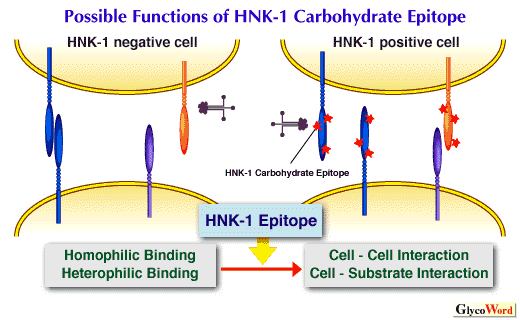| Biological Functions of the HNK-1 Carbohydrate Epitope |  |
|
 |
HNK-1 carbohydrate epitope is recognized by monoclonal antibody HNK-1,which was raised originally to a membrane fraction of human T cell line, HSB-2(1). The HNK-1 carbohydrate is also recognized by monoclonal antibodies L2, NC-1, 4F4, and M6749, which have specificity similar to that of HNK-1 antibody. The epitope is expressed on a subset of human lymphocytes, including natural killer cells and is called as CD57 in immunology. The epitope is also characteristically expressed on a series of cell adhesion molecules, including neural cell adhesion molecule (NCAM), L1,myelin-associated glycoprotein (MAG), TAG-1, P0 and others, and on some glycolipids (SGGL-1, SGGL-2) in the nervous system.
Structure
The HNK-1 epitope is demonstrated to be the sulfated trisaccharide SO4-3GlcAb1-3Galb1-4GlcNAc, which is shared with glycolipids (SGGL-1, SGGL-2) and glycoproteins (P0). The binding to HNK-1 antibody was completely eliminated by desulfation of this epitope.
Expression
The expression of the HNK-1 carbohydrate epitope is temporally and spatially regulated during development of the nervous system. For example, high expression of the HNK-1 carbohydrate is observed in the perinatal period in rat cerebral cortex and appeared to coincide with the process of myelination and/or synaptogenesis. Most of migrating neural crest cells express the HNK-1 epitope, and injection of HNK-1 antibody into chick embryos can disrupt neural crest cells migration. A characteristic alternate expression of the HNK-1 carbohydrate epitope is observed in rhombomeres and the molecular layer of cerebellum.
Biosynthesis
From knowledge of the HNK-1 epitope structure, glucuronyltransferase and sulfotransferase are assumed to be key enzymes for the biosynthesis of this epitope. It is postulated that respective glucuronyltransferases are involved in the biosynthesis of the HNK-1 epitope on glycoproteins (GlcAT-P) and on glycolipids (GlcAT-L). The GlcAT-P has been purified from rat brain and a cDNA encoding the GlcAT-P has also been isolated (2). A sulfotransferase cDNA responsible for the biosynthesis of the HNK-1 epitope has cloned from rat brain (the human homologue has been cloned recently) and the enzyme seems potentially capable of synthesizing the HNK-1 epitope on glycoproteins and glycolipids (3).
Function
Several lines of evidence indicate that the HNK-1 carbohydrate epitope has important roles in cell-cell and cell-substrate interaction, cell migration, and neurite outgrowth. It is possible that the HNK-1 carbohydrate epitope plays its role in the following ways. 1) The HNK-1 carbohydrate epitope is directly involved in cell recognition and adhesion mediated via binding proteins (receptors) on cell surface or in cell-matrix. 2) The HNK-1 carbohydrate epitope on glycoproteins may play a role in modulating the cell adhesion function of its own protein portion, as is the case with polysialic acid on NCAM. It is very important to focus attention on elucidating what part or how the HNK-1 epitope is involved in the formation of neuronal circuits. In addition, the functional significance of the HNK-1 epitope in the immune system is still unclear, despite its characteristic expression pattern. Further study is required to clarify these issues.
| |
|
 |
|
Figure Legend
Possible functions of HNK-1 carbohydrate epitope. HNK-1 carbohydrate epitope expressed on cell surface regulates cell-cell, cell-substrate interaction via binding proteins (receptors) on other cells or in cell-matrix, or modulates the function of cell adhesion molecules. | |
|
| Shogo Oka ( Kyoto University , Faculty of Pharmaceutical Sciences) | |
|
|
| References | (1) | Abo, T, Balch, CM : A differentiation antigen of human NK and K cells identified by a monoclonal antibody (HNK-1). J. Immunol. 127, 1024-1029, 1981 |
| (2) | Kozutsumi, Y, Takio, K, Kawasaki, T : Cloning and functional expression of novel glucuronyltransferase involved in the biosynthesis of the carbohydrate epitope, HNK-1. Proc. Natl. Acad. Sci. USA, 94, 6093-6098, 1997 |
| (3) | Bakker, H, Friedmann, I, Oka, S, Kawasaki, T, Nifantev, N, Schachner, M, Mantei, N : Expression Cloning of a cDNA Encoding a Sulfotransferase Involved in the Biosynthesis of the HNK-1 Carbohydrate Epitope. J. Biol. Chem. 272, 29942-29946, 1997 |
| | |
| |
|
| Jun.15, 1998 |
|
| |
|
|
|
|



